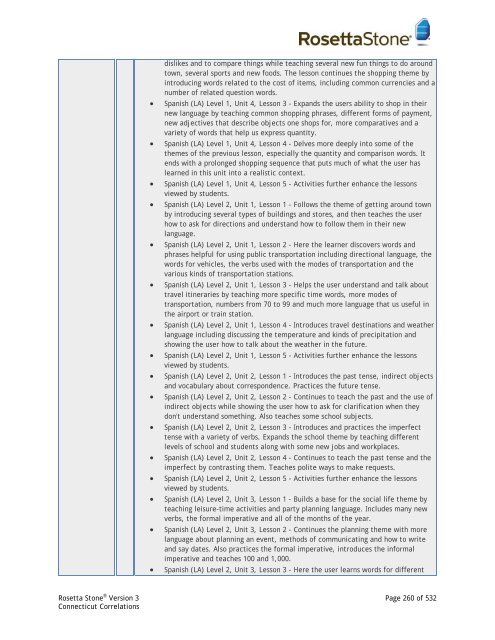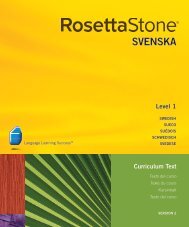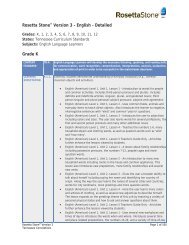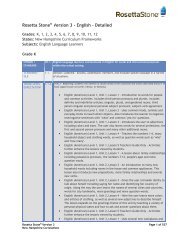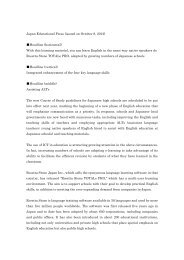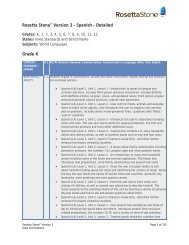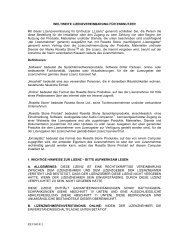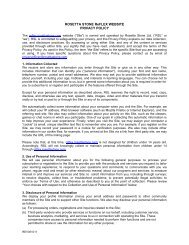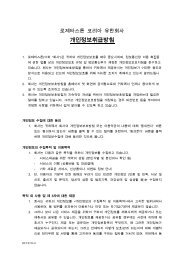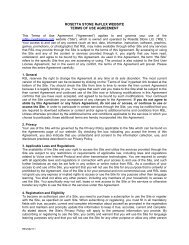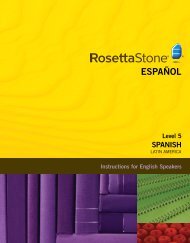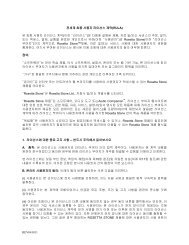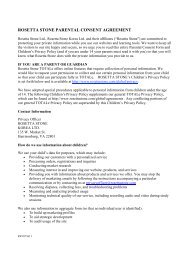- Page 1 and 2:
Rosetta Stone Version 3 - Spanish -
- Page 3 and 4:
STATE FRAMEWORK of indirect objects
- Page 5 and 6:
STATE FRAMEWORK various kinds of tr
- Page 7 and 8:
the words for vehicles, the verbs u
- Page 9 and 10:
enhance the lessons viewed by stude
- Page 11 and 12:
STATE FRAMEWORK themes of the previ
- Page 13 and 14:
STATE FRAMEWORK viewed by students.
- Page 15 and 16:
STATE FRAMEWORK more party language
- Page 17 and 18:
STATE FRAMEWORK viewed by students.
- Page 19 and 20:
language. • Spanish (LA) Level 2,
- Page 21 and 22:
• Spanish (LA) Level 1, Unit 3, L
- Page 23 and 24:
common yes/no questions. Includes d
- Page 25 and 26:
STATE FRAMEWORK • Spanish (LA) Le
- Page 27 and 28:
DOMAIN / CONTENT STANDARD STATE FRA
- Page 29 and 30:
personal physical states and how to
- Page 31 and 32:
STATE FRAMEWORK STATE FRAMEWORK lea
- Page 33 and 34:
DOMAIN / CONTENT STANDARD STATE FRA
- Page 35 and 36:
STATE FRAMEWORK the imperfect by co
- Page 37 and 38:
about herself including saying her
- Page 39 and 40:
STATE FRAMEWORK 7.3. Develop listen
- Page 41 and 42:
STATE FRAMEWORK DOMAIN / CONTENT ST
- Page 43 and 44:
day to introduce the words when and
- Page 45 and 46:
DOMAIN / CONTENT STANDARD STATE FRA
- Page 47 and 48:
Grade 1 DOMAIN / CONTENT STANDARD S
- Page 49 and 50:
STATE FRAMEWORK • Spanish (LA) Le
- Page 51 and 52:
STATE FRAMEWORK showing the user ho
- Page 53 and 54:
STATE FRAMEWORK showing the user ho
- Page 55 and 56:
• Spanish (LA) Level 1, Unit 4, L
- Page 57 and 58:
STATE FRAMEWORK STATE FRAMEWORK how
- Page 59 and 60:
• Spanish (LA) Level 1, Unit 4, L
- Page 61 and 62:
STATE FRAMEWORK • Spanish (LA) Le
- Page 63 and 64:
• Spanish (LA) Level 1, Unit 4, L
- Page 65 and 66:
including all the days of the week.
- Page 67 and 68:
STATE FRAMEWORK 2.6. Comprehend bri
- Page 69 and 70:
STATE FRAMEWORK imperative and teac
- Page 71 and 72:
STATE FRAMEWORK the airport or trai
- Page 73 and 74:
town, several sports and new foods.
- Page 75 and 76:
STATE FRAMEWORK • Spanish (LA) Le
- Page 77 and 78:
DOMAIN / CONTENT STANDARD STATE FRA
- Page 79 and 80:
STATE FRAMEWORK DOMAIN / CONTENT ST
- Page 81 and 82:
STATE FRAMEWORK STATE FRAMEWORK clo
- Page 83 and 84:
STATE FRAMEWORK same theme. 7.2. De
- Page 85 and 86:
STATE FRAMEWORK • Spanish (LA) Le
- Page 87 and 88:
• Spanish (LA) Level 2, Unit 1, L
- Page 89 and 90:
"yes/no" questions • Spanish (LA)
- Page 91 and 92:
STATE FRAMEWORK DOMAIN / CONTENT ST
- Page 93 and 94:
Grade 2 DOMAIN / CONTENT STANDARD S
- Page 95 and 96:
STATE FRAMEWORK • Spanish (LA) Le
- Page 97 and 98:
STATE FRAMEWORK showing the user ho
- Page 99 and 100:
STATE FRAMEWORK showing the user ho
- Page 101 and 102:
• Spanish (LA) Level 1, Unit 4, L
- Page 103 and 104:
STATE FRAMEWORK STATE FRAMEWORK how
- Page 105 and 106:
• Spanish (LA) Level 1, Unit 4, L
- Page 107 and 108:
STATE FRAMEWORK • Spanish (LA) Le
- Page 109 and 110:
• Spanish (LA) Level 1, Unit 4, L
- Page 111 and 112:
including all the days of the week.
- Page 113 and 114:
STATE FRAMEWORK 2.6. Comprehend bri
- Page 115 and 116:
STATE FRAMEWORK imperative and teac
- Page 117 and 118:
STATE FRAMEWORK the airport or trai
- Page 119 and 120:
town, several sports and new foods.
- Page 121 and 122:
STATE FRAMEWORK • Spanish (LA) Le
- Page 123 and 124:
DOMAIN / CONTENT STANDARD STATE FRA
- Page 125 and 126:
STATE FRAMEWORK DOMAIN / CONTENT ST
- Page 127 and 128:
STATE FRAMEWORK STATE FRAMEWORK clo
- Page 129 and 130:
STATE FRAMEWORK same theme. 7.2. De
- Page 131 and 132:
STATE FRAMEWORK • Spanish (LA) Le
- Page 133 and 134:
• Spanish (LA) Level 2, Unit 1, L
- Page 135 and 136:
"yes/no" questions • Spanish (LA)
- Page 137 and 138:
STATE FRAMEWORK DOMAIN / CONTENT ST
- Page 139 and 140:
Grade 3 DOMAIN / CONTENT STANDARD S
- Page 141 and 142:
• Spanish (LA) Level 2, Unit 2, L
- Page 143 and 144:
• Spanish (LA) Level 1, Unit 2, L
- Page 145 and 146:
STATE FRAMEWORK appropriate and if/
- Page 147 and 148:
indirect objects while showing the
- Page 149 and 150:
• Spanish (LA) Level 1, Unit 1, L
- Page 151 and 152:
large number and variety of food an
- Page 153 and 154:
• Spanish (LA) Level 2, Unit 1, L
- Page 155 and 156:
• Spanish (LA) Level 1, Unit 1, L
- Page 157 and 158:
the words for religious buildings.
- Page 159 and 160:
common activities. Includes third-p
- Page 161 and 162:
including all the days of the week.
- Page 163 and 164:
STATE FRAMEWORK • Spanish (LA) Le
- Page 165 and 166:
• Spanish (LA) Level 1, Unit 4, L
- Page 167 and 168:
STATE FRAMEWORK STATE FRAMEWORK STA
- Page 169 and 170:
ends with a prolonged shopping sequ
- Page 171 and 172:
STATE FRAMEWORK teaching words for
- Page 173 and 174:
don't understand something. Also te
- Page 175 and 176:
colors and sizes. The user also lea
- Page 177 and 178:
• Spanish (LA) Level 2, Unit 4, L
- Page 179 and 180:
STATE FRAMEWORK STATE FRAMEWORK dif
- Page 181 and 182:
STATE FRAMEWORK many related verbs
- Page 183 and 184:
STATE FRAMEWORK STATE FRAMEWORK •
- Page 185 and 186:
STATE FRAMEWORK DOMAIN / CONTENT ST
- Page 187 and 188:
DOMAIN / CONTENT STANDARD STATE FRA
- Page 189 and 190:
• Spanish (LA) Level 2, Unit 2, L
- Page 191 and 192:
DOMAIN / CONTENT STANDARD STATE FRA
- Page 193 and 194:
dislikes and to compare things whil
- Page 195 and 196:
STATE FRAMEWORK • Spanish (LA) Le
- Page 197 and 198:
the airport or train station. • S
- Page 199 and 200:
STATE FRAMEWORK STATE FRAMEWORK DOM
- Page 201 and 202:
introduces new prepositions, more f
- Page 203 and 204:
• Spanish (LA) Level 3, Unit 1, L
- Page 205 and 206:
STATE FRAMEWORK STATE FRAMEWORK sho
- Page 207 and 208:
several languages and the numbers f
- Page 209 and 210: STATE FRAMEWORK directions, new cou
- Page 211 and 212: the airport or train station. • S
- Page 213 and 214: elated prepositions, the numbers 13
- Page 215 and 216: STATE FRAMEWORK mood along with use
- Page 217 and 218: • Spanish (LA) Level 1, Unit 4, L
- Page 219 and 220: STATE FRAMEWORK enhance the lessons
- Page 221 and 222: STATE FRAMEWORK STATE FRAMEWORK int
- Page 223 and 224: viewed by students. • Spanish (LA
- Page 225 and 226: STATE FRAMEWORK DOMAIN / CONTENT ST
- Page 227 and 228: STATE FRAMEWORK into a section on m
- Page 229 and 230: don't understand something. Also te
- Page 231 and 232: • Spanish (LA) Level 1, Unit 1, L
- Page 233 and 234: large number and variety of food an
- Page 235 and 236: second person pronouns and many oth
- Page 237 and 238: the words for a variety of landmark
- Page 239 and 240: including all the days of the week.
- Page 241 and 242: STATE FRAMEWORK • Spanish (LA) Le
- Page 243 and 244: themes of the previous lesson, espe
- Page 245 and 246: DOMAIN / CONTENT STANDARD STATE FRA
- Page 247 and 248: names of several stores and plenty
- Page 249 and 250: DOMAIN / CONTENT STANDARD STATE FRA
- Page 251 and 252: STATE FRAMEWORK STATE FRAMEWORK col
- Page 253 and 254: STATE FRAMEWORK STATE FRAMEWORK adj
- Page 255 and 256: STATE FRAMEWORK probably, and nothi
- Page 257 and 258: STATE FRAMEWORK • Spanish (LA) Le
- Page 259: • Spanish (LA) Level 1, Unit 1, L
- Page 263 and 264: • Spanish (LA) Level 1, Unit 2, L
- Page 265 and 266: • Spanish (LA) Level 3, Unit 1, L
- Page 267 and 268: STATE FRAMEWORK STATE FRAMEWORK var
- Page 269 and 270: words for vehicles, the verbs used
- Page 271 and 272: STATE FRAMEWORK STATE FRAMEWORK DOM
- Page 273 and 274: Grade 5 DOMAIN / CONTENT STANDARD S
- Page 275 and 276: • Spanish (LA) Level 2, Unit 2, L
- Page 277 and 278: STATE FRAMEWORK • Spanish (LA) Le
- Page 279 and 280: and indefinite articles; singular,
- Page 281 and 282: • Spanish (LA) Level 2, Unit 3, L
- Page 283 and 284: DOMAIN / CONTENT STANDARD STATE FRA
- Page 285 and 286: verbs, the formal imperative and al
- Page 287 and 288: items to teach direct objects. Also
- Page 289 and 290: • Spanish (LA) Level 2, Unit 3, L
- Page 291 and 292: introduces new prepositions, more f
- Page 293 and 294: • Spanish (LA) Level 3, Unit 1, L
- Page 295 and 296: same theme. • Spanish (LA) Level
- Page 297 and 298: DOMAIN / CONTENT STANDARD STATE FRA
- Page 299 and 300: STATE FRAMEWORK STATE FRAMEWORK •
- Page 301 and 302: STATE FRAMEWORK into a section on m
- Page 303 and 304: STATE FRAMEWORK • Spanish (LA) Le
- Page 305 and 306: levels of school and students along
- Page 307 and 308: STATE FRAMEWORK STATE FRAMEWORK STA
- Page 309 and 310: DOMAIN / CONTENT STANDARD STATE FRA
- Page 311 and 312:
DOMAIN / CONTENT STANDARD STATE FRA
- Page 313 and 314:
Grade 6 DOMAIN / CONTENT STANDARD S
- Page 315 and 316:
viewed by students. • Spanish (LA
- Page 317 and 318:
STATE FRAMEWORK • Spanish (LA) Le
- Page 319 and 320:
and indefinite articles; singular,
- Page 321 and 322:
• Spanish (LA) Level 2, Unit 3, L
- Page 323 and 324:
DOMAIN / CONTENT STANDARD STATE FRA
- Page 325 and 326:
verbs, the formal imperative and al
- Page 327 and 328:
items to teach direct objects. Also
- Page 329 and 330:
• Spanish (LA) Level 2, Unit 3, L
- Page 331 and 332:
introduces new prepositions, more f
- Page 333 and 334:
• Spanish (LA) Level 3, Unit 1, L
- Page 335 and 336:
same theme. • Spanish (LA) Level
- Page 337 and 338:
DOMAIN / CONTENT STANDARD STATE FRA
- Page 339 and 340:
STATE FRAMEWORK STATE FRAMEWORK •
- Page 341 and 342:
STATE FRAMEWORK into a section on m
- Page 343 and 344:
STATE FRAMEWORK • Spanish (LA) Le
- Page 345 and 346:
levels of school and students along
- Page 347 and 348:
STATE FRAMEWORK STATE FRAMEWORK STA
- Page 349 and 350:
DOMAIN / CONTENT STANDARD STATE FRA
- Page 351 and 352:
DOMAIN / CONTENT STANDARD STATE FRA
- Page 353 and 354:
Grade 7 DOMAIN / CONTENT STANDARD S
- Page 355 and 356:
viewed by students. • Spanish (LA
- Page 357 and 358:
STATE FRAMEWORK • Spanish (LA) Le
- Page 359 and 360:
and indefinite articles; singular,
- Page 361 and 362:
• Spanish (LA) Level 2, Unit 3, L
- Page 363 and 364:
DOMAIN / CONTENT STANDARD STATE FRA
- Page 365 and 366:
verbs, the formal imperative and al
- Page 367 and 368:
items to teach direct objects. Also
- Page 369 and 370:
• Spanish (LA) Level 2, Unit 3, L
- Page 371 and 372:
introduces new prepositions, more f
- Page 373 and 374:
• Spanish (LA) Level 3, Unit 1, L
- Page 375 and 376:
same theme. • Spanish (LA) Level
- Page 377 and 378:
DOMAIN / CONTENT STANDARD STATE FRA
- Page 379 and 380:
STATE FRAMEWORK STATE FRAMEWORK •
- Page 381 and 382:
STATE FRAMEWORK into a section on m
- Page 383 and 384:
STATE FRAMEWORK • Spanish (LA) Le
- Page 385 and 386:
levels of school and students along
- Page 387 and 388:
STATE FRAMEWORK STATE FRAMEWORK STA
- Page 389 and 390:
DOMAIN / CONTENT STANDARD STATE FRA
- Page 391 and 392:
DOMAIN / CONTENT STANDARD STATE FRA
- Page 393 and 394:
Grade 8 DOMAIN / CONTENT STANDARD S
- Page 395 and 396:
• Spanish (LA) Level 2, Unit 2, L
- Page 397 and 398:
STATE FRAMEWORK • Spanish (LA) Le
- Page 399 and 400:
and indefinite articles; singular,
- Page 401 and 402:
• Spanish (LA) Level 2, Unit 3, L
- Page 403 and 404:
DOMAIN / CONTENT STANDARD STATE FRA
- Page 405 and 406:
verbs, the formal imperative and al
- Page 407 and 408:
items to teach direct objects. Also
- Page 409 and 410:
• Spanish (LA) Level 2, Unit 3, L
- Page 411 and 412:
introduces new prepositions, more f
- Page 413 and 414:
• Spanish (LA) Level 3, Unit 1, L
- Page 415 and 416:
same theme. • Spanish (LA) Level
- Page 417 and 418:
DOMAIN / CONTENT STANDARD STATE FRA
- Page 419 and 420:
STATE FRAMEWORK STATE FRAMEWORK •
- Page 421 and 422:
STATE FRAMEWORK into a section on m
- Page 423 and 424:
STATE FRAMEWORK • Spanish (LA) Le
- Page 425 and 426:
levels of school and students along
- Page 427 and 428:
STATE FRAMEWORK STATE FRAMEWORK STA
- Page 429 and 430:
DOMAIN / CONTENT STANDARD STATE FRA
- Page 431 and 432:
DOMAIN / CONTENT STANDARD STATE FRA
- Page 433 and 434:
Grade 9 DOMAIN / CONTENT STANDARD S
- Page 435 and 436:
city landmarks, more greetings and
- Page 437 and 438:
verbs. • Spanish (LA) Level 3, Un
- Page 439 and 440:
DOMAIN / CONTENT STANDARD STATE FRA
- Page 441 and 442:
• Spanish (LA) Level 2, Unit 1, L
- Page 443 and 444:
STATE FRAMEWORK STATE FRAMEWORK DOM
- Page 445 and 446:
STATE FRAMEWORK language about plan
- Page 447 and 448:
STATE FRAMEWORK appropriate and if/
- Page 449 and 450:
yes/no questions. Includes direct m
- Page 451 and 452:
enhance the lessons viewed by stude
- Page 453 and 454:
DOMAIN / CONTENT STANDARD STATE FRA
- Page 455 and 456:
DOMAIN / CONTENT STANDARD STATE FRA
- Page 457 and 458:
STATE FRAMEWORK STATE FRAMEWORK STA
- Page 459 and 460:
STATE FRAMEWORK STATE FRAMEWORK sup
- Page 461 and 462:
• Spanish (LA) Level 2, Unit 1, L
- Page 463 and 464:
STATE FRAMEWORK STATE FRAMEWORK STA
- Page 465 and 466:
introduces new prepositions, more f
- Page 467 and 468:
• Spanish (LA) Level 3, Unit 1, L
- Page 469 and 470:
STATE FRAMEWORK by introducing seve
- Page 471 and 472:
STATE FRAMEWORK • Spanish (LA) Le
- Page 473 and 474:
STATE FRAMEWORK DOMAIN / CONTENT ST
- Page 475 and 476:
number of related question words.
- Page 477 and 478:
STATE FRAMEWORK DOMAIN / CONTENT ST
- Page 479 and 480:
STATE FRAMEWORK • Spanish (LA) Le
- Page 481 and 482:
STATE FRAMEWORK STATE FRAMEWORK DOM
- Page 483 and 484:
Grade 11 DOMAIN / CONTENT STANDARD
- Page 485 and 486:
Along the way the user learns the n
- Page 487 and 488:
a typical kitchen, bathroom and liv
- Page 489 and 490:
DOMAIN / CONTENT STANDARD STATE FRA
- Page 491 and 492:
• Spanish (LA) Level 2, Unit 1, L
- Page 493 and 494:
STATE FRAMEWORK STATE FRAMEWORK DOM
- Page 495 and 496:
STATE FRAMEWORK language about plan
- Page 497 and 498:
STATE FRAMEWORK appropriate and if/
- Page 499 and 500:
yes/no questions. Includes direct m
- Page 501 and 502:
enhance the lessons viewed by stude
- Page 503 and 504:
DOMAIN / CONTENT STANDARD STATE FRA
- Page 505 and 506:
DOMAIN / CONTENT STANDARD STATE FRA
- Page 507 and 508:
STATE FRAMEWORK STATE FRAMEWORK STA
- Page 509 and 510:
STATE FRAMEWORK STATE FRAMEWORK coo
- Page 511 and 512:
travel itineraries by teaching more
- Page 513 and 514:
STATE FRAMEWORK STATE FRAMEWORK STA
- Page 515 and 516:
about herself including saying her
- Page 517 and 518:
• Spanish (LA) Level 3, Unit 1, L
- Page 519 and 520:
STATE FRAMEWORK how to ask for dire
- Page 521 and 522:
STATE FRAMEWORK many related verbs
- Page 523 and 524:
STATE FRAMEWORK DOMAIN / CONTENT ST
- Page 525 and 526:
new adjectives that describe object
- Page 527 and 528:
STATE FRAMEWORK DOMAIN / CONTENT ST
- Page 529 and 530:
STATE FRAMEWORK • Spanish (LA) Le
- Page 531 and 532:
STATE FRAMEWORK STATE FRAMEWORK DOM


